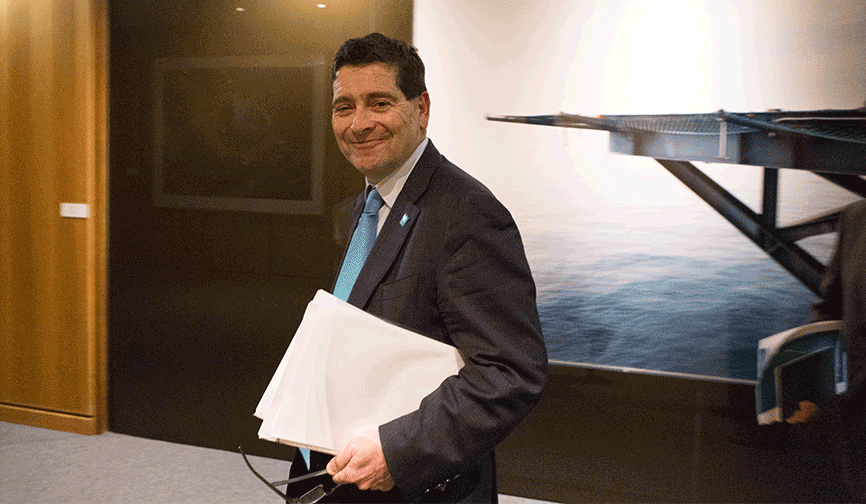Antonio Ramalho pointed out: “This sector [construção] A life protected and overprotected by the state. The movement of the sector is always determined by the public client,” referring to the quality of the state as a client, regulator and legislator.
On Tuesday, the City of Leiria hosted the Future of Construction and Green Industries Challenge conference. A debate promoted by JE and sponsored by Transfor. In the session “The Future of Construction: The Challenge of Green Industries”, Antonio Ramalho, former Director and CEO of Novobanco, former President of Infraestruturas de Portugal, and Consultant at Alvarez & Marsal, among others, presented his vision on the real estate sector and the real estate sector. The moment he lives.
“This sector has a unique characteristic that should lead to reflection, which is that it has waves of movement in terms of its importance in the country’s GDP, in the financial system and in employment, with unexpected variations and fluctuations,” Ramalho said.
“We have built the third largest highway network in the world,” the director said, stressing that “we have the capacity.”
Antonio Ramalho pointed out: “This sector [construção] A life protected and overprotected by the state. The movement of the sector is always determined by the public client,” he said, referring to the quality of the state as a client, as a regulator and a legislator, which, in his opinion, justifies excessive bureaucracy and informality in order to “solve problems.”
He explained that “the key to any sector always involves two characteristics, and in this sector there is a third characteristic: permanence, predictability, and containment,” because work is something that remains.
Antonio Ramalho sees three major tensions in the sector in Portugal, two of which have international origins – the energy transition and the digital transformation – which add “a significant imbalance between supply and demand on the side of the housing structure and even on other sides.”
“We only need to build 100,000 homes and we already have almost 10 billion euros in investments,” he said.
The director explained that Portugal has not built anything in the past ten years, and at the moment “we have 4.9% of homes in Portugal that are more than 100 years old, and 3.9% of homes that are less than 10 years old.” “, he stated.
“With over 75, we have more than 60% of homes, and the housing stock needs to be replenished,” said Ramalho, who recalls that 61.3% of families own their homes.
“If we take into account that we have no more than 1.2 children, this house is about to be renovated,” says the manager, who explains that the average of each new mortgage is 123 thousand euros and the average of all mortgage loans a total of 63 thousand euros. “That is why there are still no claims on mortgage loans, because people owe so little,” stressed the former banker, who pointed to the “very violent rise in interest rates” that families have suffered.
Antonio Ramalho talks about the market conditions to bring about a paradigm shift from a construction point of view. “We will need efficiency that we do not have, and it is true that there are also a range of costs that will affect current activity,” the manager said.
António Ramalho, who supported the statement with figures, said that the Portuguese “like expensive construction.” “We have 119 square meters per person, twice as much as in Japan. We love having an extra room, almost 60% of families do. We are the second country in Europe to have a second home.”
On the other hand, he mentioned that the BEEM system has been introduced in Europe in public works infrastructure, but, says the Director, the details of this system will inevitably depend on the private sector.
“If there is demand, technology and history, this sector has a future,” Ramalho stressed, despite the “fall” of many construction companies. Regarding the bankruptcy of many construction companies, the director said, “This disruption effect has to do with the post-Troika phase, which was born from the excess demand that existed before.”
“There is a future for construction, but there will be big changes,” he said.
“This is one of the sectors where I cannot understand the value chain. Because every time there is competition in banking, credit spreads will fall sharply from 0.25% to 0.5%, which will affect 30 years of credit, and the commission for real estate agents will also not be reduced.” , which is always 5%,” said Antonio Ramalho. Who expects greater flexibility in the future.
The panel also included José Carlos Pinto Nogueira, CFO of Mota-Engil, Miguel Saraiva, architect and CEO of Architect Saraiva e Associados, and Thiago Marto, Chairman of the Board of Directors of Transfor.

“Wannabe internet buff. Future teen idol. Hardcore zombie guru. Gamer. Avid creator. Entrepreneur. Bacon ninja.”

